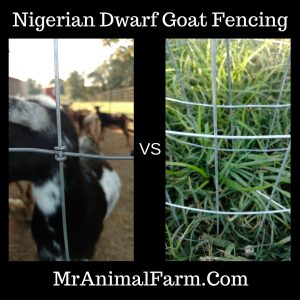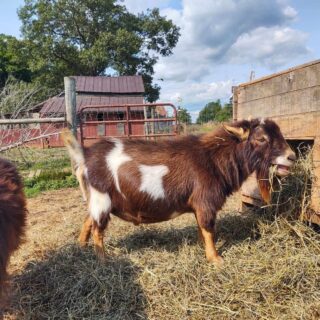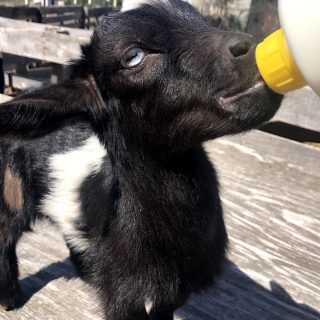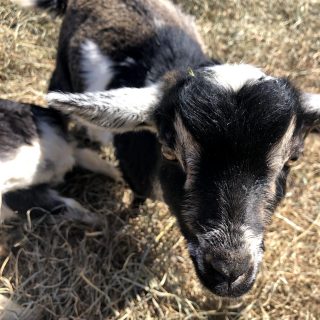Since we are new to Nigerian Dwarf goats, we have done quite a lot of research getting ready for our three coming in the next week. I like to know what I am getting into in as much detail as possible. Goat fencing can be confusing because there are a lot of opinions on what does and does not work.
However, in reality, experience is the only way to know if something works or not. There are three most important things to get ready for your new goats in addition to the regular goat supplies, of course.
One, where are we going to put the goats - there are lots of can try. Two, how are we going to contain the goats (fencing). Three, what are we going to feed the goats (food).
I've quickly learned that there are so many opinions on each of the three above areas and I think that different ways work for different people. If you haven't purchased your goats yet, find out how to buy a goat and get started raising them!
It can be really overwhelming with all of the options for each area and no clear answer. For that reason, I want to focus here on Nigerian Dwarf Goat fencing in the hopes that I can provide concise information for others just getting into goats.
Goat Fencing Types & Terminology
First, to make sure we are all on the same page with fencing terminology, let's review the different kinds of fencing. There is welded wire fencing, woven wire fencing and electric fencing.
Welded wire is a type of fencing that the squares are welded together. Woven wire fencing the squares are woven at the corners. Electric fencing is exactly what it sounds like - it is high tensile wire connected to a charger to make the fence "hot" or electric.
Additionally, there are different heights and sizes (of squares). All of these options can be combined until your head is spinning.
I do believe that the various goat fencing options and combinations can probably all be used successfully for containing Nigerian Dwarf Goats. It likely depends on the goats themselves as well as fence installation and other variables.
No one can decide which goat fencing option is best for you, but I can provide you with general pros and cons for each fencing to help you decide.
Pros & Cons to Goat Fencing Types
Wire goat fencing
Welded wire is among the cheapest of the goat fencing options. However, it is not as sturdy as woven wire. Depending on how your goats are, they may or may not be able to rub the welded areas apart. We learned the hard way that welded wire and bucks do NOT go well together.
Woven wire is very sturdy, but is likely the most expensive of the options for goat fencing. However, it does tend to withstand more wear and tear and last considerably longer.
Additionally, if you have livestock guard dogs, some may have a tendency to dig under or climb over a physical fence. You can simply add an invisible fence to help keep them in too, but make sure you regularly check for any breaks in the fence so they can't sneak out.
Size of Wire Fencing Squares
With both welded and woven wire you also have to look at the size of the squares. Typically they can be 2x4, 4x4 or 6x6. The smaller the square, the more costly the fencing.
The 6x6 squares are not the best option, especially if you will have goats with horns or babies. Horned goats can stick their heads through these larger squares and get stuck causing injury to themselves or making themselves vulnerable to predators.
Additionally, babies can squeeze through the 6x6 squares. If you do choose to go with the larger 6x6 squares, you can add a strand or two of electric to prevent injury and escape.
Electric Fencing for Goats
Electric fencing for goats is easy to install and probably the cheapest of all three options for goat fencing. You can do 2 strands up to 7 strands.
The con to electric fencing for goats is that not all Nigerian Dwarf goats seem to respect the wires and some will walk right through.
If it is properly charged (with no brush shorting it out), and the goats are "trained" to respect it most people seem to have good luck with it. However, it can be A LOT of work to make sure that the bottom strand is not touching grass and therefore staying "hot".
Goat fence Height
You'll also need to decide on the best goat fence height for your fencing. 36 inch wire fence tends to be a little on the short side and some goats will be able to jump that. 48 inch wire fencing tends to be tall enough that (most) goats can't or won't try to jump it. If you are using electric fencing for your goats, you should probably aim to have your strands at least up to the 48 inch mark as well.
Best fence for goats
The best fence for goats really can depend on your herd and what you are looking for. However, if you are looking for the best fence that will have longevity and extra security, you might want to choose the route we did.
We chose to go the more expensive route of 48 inch tall woven wire with 4x4 squares. This way the goat fencing will hold up to wear and tear, it tall enough to prevent jumping (unless you have an extra naughty goat), and doesn't take much upkeep once it is in place.
Hopefully the above information will provide you with the knowledge you need to decide which goat fencing suits your situation.
Here is a video of our goat fencing in action:
[wpdevart_youtube]ms1rr9w0MMk[/wpdevart_youtube]
Let us know what goat fencing options you decide to go with in the comment section below.
For more on goats, check these out:
[pt_view id="89114c7qgm"]





Vixxcottage says
Cattle panels work best for me.